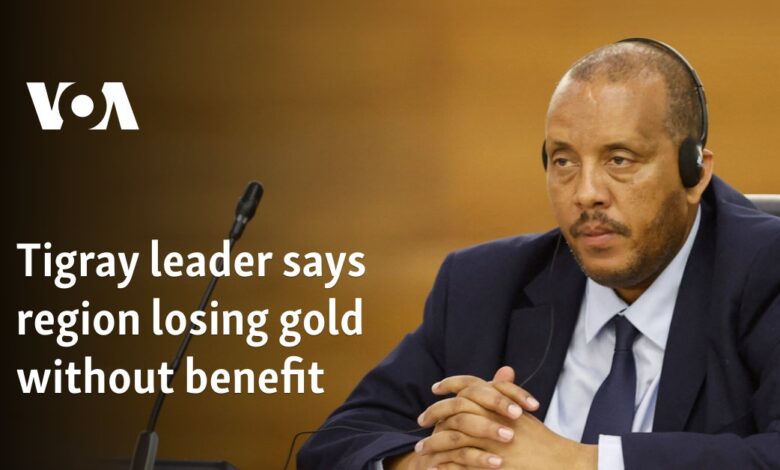Tigray leader says the region is losing gold for nothing

Ethiopia’s Prime Minister recently praised the country’s mining resources and said the industry could achieve a historic milestone by generating up to $2 billion in gold revenue this year. He said this while inaugurating a gold prospecting and mining plant in the Gambella region.
On December 10, Abiy Ahmed reported that Ethiopia’s economy is “one of the fastest growing economies in Africa and a beacon of opportunity on the continent.”
“Among the many thriving sectors, the gold mining industry stands out as an important driver of growth, offering huge potential for both domestic and international investment,” he said on social media.
But officials in Tigray, one of Ethiopia’s richest gold mining regions, say they are losing resources with no benefit to their region at a time when Tigray is trying to recover from a brutal two-year war between local rebels and the federal government.
Interim President of Tigray, Getachew Reda, speaking on November 15, said that during the previous three and a half months (August, September and October) “28.25 quintals of gold entered the federal government.” He added: “The government has not received a single penny.”
The Commercial Bank of Ethiopia, through its branch in Shire Enda Silas, the gold hub of Tigray, recently purchased $132 million worth of gold in just three months, according to branch manager Tiki Geday. The entire budget for the Tigray region for this year is approximately $100 million.
Officials in Tigray said the region is suffering from a budget shortfall as it tries to restore services that were halted or destroyed during the war.
Environmental concerns
In addition to the lack of economic benefits, officials in Tigray reported that gold mining exposed some residents of the region to dangerous chemicals such as mercury and cyanide, which are used to extract gold.
Witnesses and officials said residents living near the mining fields say the chemicals were harmful to humans and livestock, with reports of disfigured cow hide and degraded farmland.
Some residents in the northwestern Tigray region went to the courts seeking justice, to get judges to take action against gold miners, whom they accuse of polluting the environment and causing ill health to their children.
North West Supreme Court Chief Justice Mengistu Teklay told Voice of America that chemicals used by miners have become a source of health, security and stability concerns.
“Uses of natural resources must be subject to law and order. They should not benefit a few individuals,” Mengistu said. “Individuals who take advantage of these resources should not be allowed to bring safety concerns, existential threats, and health concerns to an unbenefited public.”
Cyanide and mercury were used during the mining operation in Tigray, according to multiple interviews conducted by Voice of America’s Horn of Africa service. The World Health Organization identifies mercury as one of the top 10 chemicals or chemical groups that pose public health concerns.
Alarmed by the use of chemicals, the Ethiopia Innovation and Technology Bureau, a government body charged with overseeing the country’s scientific and technological development, has asked regional government institutions in Tigray to take action to prevent the unsafe use of chemicals.
Gesachew Woldetsadek Payne is Director of the Radiation and Nuclear Safety Department at the Tigray Innovation and Technology Office. He said a team from the office disguised as traditional miners traveled to the mining areas and witnessed what he described as a “sad” situation.
“It’s very scary,” Gizzaccio said, sharing a video of a cow affected by the chemicals, and photos of women washing soil with chemicals in search of gold without safety protocols and with their bare hands.
“We’ve seen the damage to the animals, to the land, to the soil, to people who use running water and suffer, with their skin damaged, to animals who drink that water and to be exposed to serious diseases,” Gizzaccio said.
Action taken
This week, the Tigray region’s cabinet called for a halt to gold mining. This was announced by the Deputy Head of the Tigray Interim Administration, Lieutenant General Tsadkan Gebretinsay. He did not clarify when the suspension would begin and how the measure would be implemented.
Before that, the Tigray Communications Affairs Office said in a statement that action had been taken against people who were using illegal dangerous chemicals to process gold in the Tahtay Koraro area near a dam that is a source of drinking water for the city of Shire Enda Silas.
No details were provided about the procedures and type of chemicals used.
A security source, who requested anonymity because he was not authorized to speak to the media, claimed that foreign companies are working with Ezana Mining Development, a local mining company.
Ezana’s president, Tesfatsion Desta, did not initially respond to VOA calls.
After a VOA Tigrigna radio report aired, Izana issued a statement saying she had not been asked to comment on the story, which she called “distorted.”
Izana said in the statement that she worked with foreign companies before the Tigray war. The statement continued that due to insecurity and instability, these companies did not return after the war.
The company said that the gold factory, located in the Asgedi region of northwestern Tigray, in the Tapia Limat region, is free of pollution, waste and environmental distractions.
Without naming a specific country, Tigray President Getachew told the region’s diaspora community in a Zoom meeting that he believes more gold than has been reported is being smuggled from Ethiopia.
Getachew said that what is happening in Tigray has become a “crime.”
“It is a very serious problem. It is not just theft. People are losing their animals because of the dangerous chemicals used by miners. There are people known to be involved in this network from top to bottom among government and security officials.”
Voice of America’s repeated attempts to obtain comment from the Tigray Land and Mining Office and the Mining Ministry, as well as the National Bank of Ethiopia, were unsuccessful.
This story originated in Voice of America Horn of Africa Service.
https://gdb.voanews.com/DFE03ED2-7B7C-46F8-A21D-95AF980F445E.jpg




